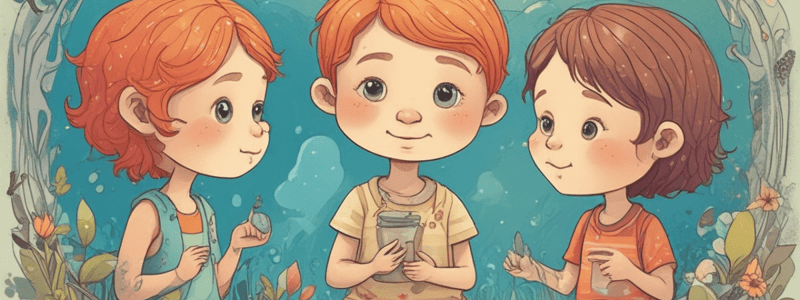Podcast
Questions and Answers
At what age do children typically start to recognize their own reflection in mirrors and identify themselves in photographs?
At what age do children typically start to recognize their own reflection in mirrors and identify themselves in photographs?
- Infancy
- Age 2-3 (correct)
- Age 5-6
- Toddlerhood
What is a key characteristic of a child's emerging self-concept?
What is a key characteristic of a child's emerging self-concept?
- Lack of personal preferences
- Increased shyness
- Use of pronouns such as I, me, and my (correct)
- Fear of mirrors
What is a significant aspect of a child's self-awareness at around age 5?
What is a significant aspect of a child's self-awareness at around age 5?
- Ability to describe themselves using adjectives (correct)
- Fear of strangers
- Ability to count to 10
- Ability to ride a bike
What is a crucial role played by comparison in early childhood?
What is a crucial role played by comparison in early childhood?
What is an indicator of a higher level of emotional intelligence in children?
What is an indicator of a higher level of emotional intelligence in children?
What is a significant aspect of social development in early childhood?
What is a significant aspect of social development in early childhood?
What do children start to develop at around age 5, replacing external attributes?
What do children start to develop at around age 5, replacing external attributes?
What is a result of engaging in complex social roles through play?
What is a result of engaging in complex social roles through play?
What do children begin to express at around age 5?
What do children begin to express at around age 5?
What is the result of the gradual development of self-awareness in early childhood?
What is the result of the gradual development of self-awareness in early childhood?
Flashcards are hidden until you start studying
Study Notes
Sense of Self in Child Development
- A sense of self in child development refers to how a child perceives, comprehends, and feels about themselves, encompassing their understanding of their personality, traits, strengths, weaknesses, and role within their surroundings.
- Developing a robust sense of self is vital as it affects all aspects of a child's interactions and growth, shaping how they engage with others, deal with challenges and achievements, and make decisions.
Developing Sense of Self from Birth
- From birth, children begin to develop their sense of self through curiosity and discovery of their unique identity, including their likes, dislikes, and what motivates them.
- Mentalizing, or understanding another person's thoughts, feelings, and intentions, plays a key role in developing a sense of self, as it helps children feel valued and understood.
Essential Experiences for Developing a Positive Sense of Self
- Seven essential experiences contribute to constructing a positive and productive sense of self in young children, including:
- Acceptance and respect, creating an environment where children feel accepted and respected.
- Success with meaningful tasks, engaging children in tasks that result in tangible outcomes to boost their self-esteem.
- Association with positive role models, highlighting interactions in the classroom that inspire children and provide a framework for acting in challenging situations.
- Honest feedback, providing children with specific and constructive feedback to help them understand what they do well and where to improve.
- Genuinely challenging and meaningful tasks, tasks that challenge children appropriately and encourage critical thinking and problem-solving.
- Opportunities for meaningful peer interaction, facilitating positive peer interactions in the classroom to help children learn how to cooperate, share, and build friendships.
- Coping with defeats, teaching children to manage disappointment and setbacks, an important life skill.
Self-Awareness in Early Childhood
- Self-awareness in early childhood refers to the ability of young children to understand their own feelings, desires, and actions, and how they are different from others.
- Developing self-awareness helps children manage their emotions better and make good choices, with teachers and parents playing a crucial role in guiding them through their experiences.
Stages of Developing Self-Awareness
- The development of self-awareness in children progresses through various stages, including:
- Age 3: Foundations of self-awareness, recognizing their own reflection, and identifying themselves in photographs, starting to use pronouns, and developing a sense of ownership.
- Age 4: Expressing likes and dislikes, developing personal preferences, and a deeper sense of self, noticing and verbalizing differences between themselves and their peers.
- Age 5: Describing themselves using adjectives, showing an awareness of their internal characteristics, predicting how situations might make them feel, and managing their emotions more effectively.
Studying That Suits You
Use AI to generate personalized quizzes and flashcards to suit your learning preferences.




